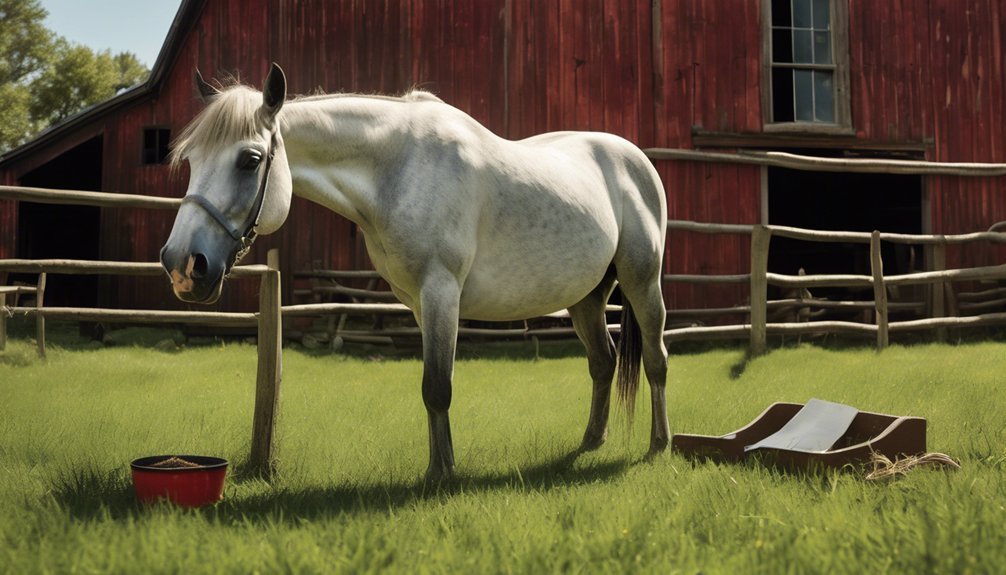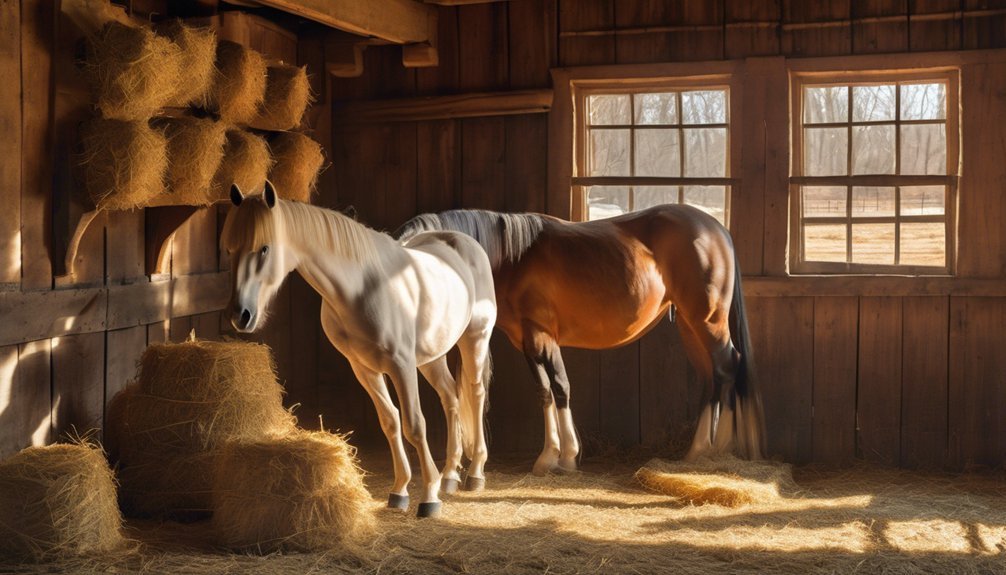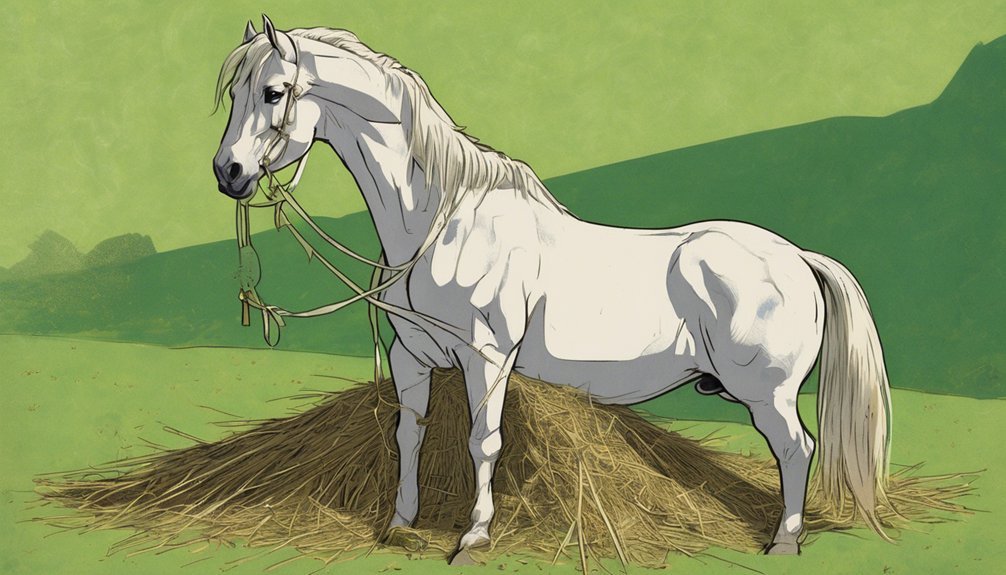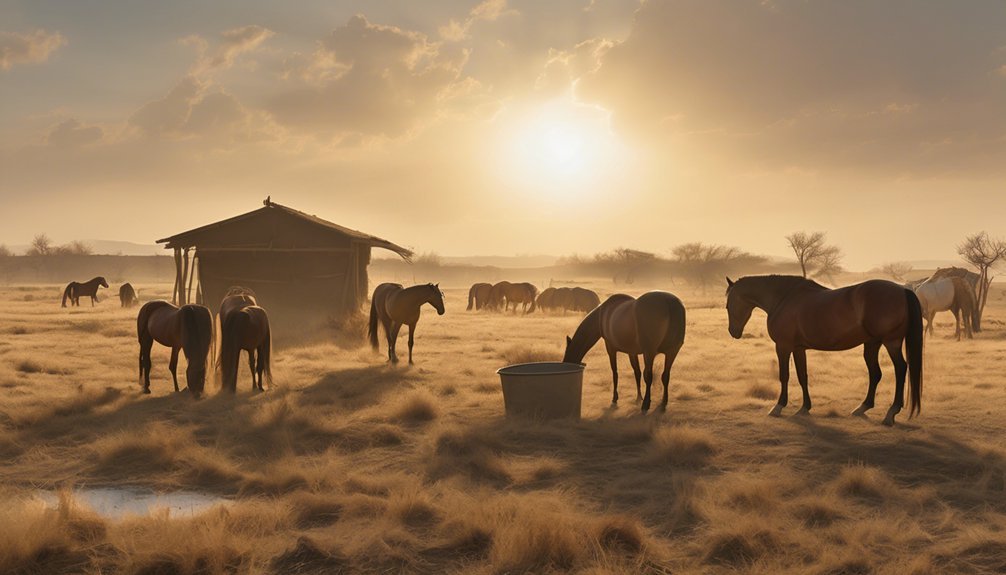
It's interesting how many horse owners overlook the importance of body condition when managing an underweight horse. You may find that addressing their specific nutritional needs can significantly impact their overall health and performance. By understanding how to assess their body condition score and selecting appropriate feeds, you can create an effective feeding strategy. The following sections will explore essential components to help your horse gain weight and improve its well-being.
Key Takeaways
- Assess the horse's Body Condition Score (BCS) to determine the appropriate feeding strategy for weight gain.
- Choose high-calorie feeds like oats, corn, and grain mixes to provide concentrated energy for weight gain.
- Establish a consistent feeding schedule with smaller, more frequent meals to enhance nutrient absorption and digestive health.
- Incorporate nutritional supplements such as protein boosters and omega-3 fatty acids to support muscle development and coat condition.
- Monitor progress by regularly weighing the horse and adjusting the diet based on energy levels and coat condition.
Assessing Your Horse's Body Condition Score

When you assess your horse's body condition score (BCS), you're not just evaluating its weight; you're measuring overall health and well-being.
This process involves a systematic visual assessment of key areas such as the neck, withers, ribs, and hindquarters. You'll want to look for fat deposits, muscle tone, and overall shape.
A BCS typically ranges from 1 to 9, with a score of 5 indicating an ideal condition. As you evaluate, consider how these factors reflect your horse's nutritional status and physical activity level.
Being attentive to these details nurtures a deeper bond with your horse, allowing you to make informed decisions about its care.
Regular assessments create a path toward improved health and vitality.
Choosing the Right Feed for Weight Gain
Selecting the right feed for weight gain is crucial for underweight horses, as it directly impacts their health and recovery.
Focus on high calorie feeds that provide concentrated energy, such as oats, corn, or specially formulated grain mixes. These options help ensure your horse receives the necessary caloric intake.
Additionally, incorporating quality protein sources, like soybean meal or alfalfa, supports muscle development and overall body condition.
Look for feeds enriched with vitamins and minerals to enhance nutrient absorption and promote optimal growth.
Keep in mind that gradual weight gain is essential; sudden changes can lead to digestive issues.
Establishing a Consistent Feeding Schedule

Establishing a consistent feeding schedule is vital for promoting healthy weight gain in underweight horses, as it helps regulate their metabolism and supports digestive health.
To optimize meal timing and portion control, consider these strategies:
- Regular Intervals: Feed your horse at the same times each day to create routine and predictability.
- Controlled Portions: Divide daily feed into smaller, more frequent meals, which can enhance nutrient absorption and prevent digestive issues.
- Monitor Weight: Regularly assess your horse's weight to adjust portion sizes accordingly, ensuring you're meeting their needs without overfeeding.
Incorporating Nutritional Supplements
Incorporating nutritional supplements can significantly enhance the diets of underweight horses, especially when they require specific vitamins and minerals to support their weight gain. Understanding nutrient timing is crucial; administering supplements at optimal times can maximize absorption and benefits. Here's a brief overview of supplement types you might consider:
| Supplement Type | Purpose |
|---|---|
| Protein Boosters | Enhance muscle development |
| Omega-3 Fatty Acids | Improve coat condition |
| Electrolytes | Maintain hydration |
| Vitamins (A, E, D) | Support immune function |
| Minerals (Calcium, Phosphorus) | Aid bone health |
Tailoring these supplements to your horse's individual needs will ensure they're getting the right nutrients at the right time, fostering a healthier, happier animal.
Monitoring Progress and Adjusting the Diet

As you monitor your horse's progress, it's essential to regularly assess their weight, body condition, and overall health to determine if dietary adjustments are necessary.
Effective weight tracking will help you identify trends and make informed decisions. Here are three key aspects to focus on:
- Regular Weighing: Use a reliable scale or weigh tape every two weeks to track any weight changes accurately.
- Body Condition Scoring: Evaluate your horse's body condition using a standardized scoring system, aiming for a score that indicates a healthy weight.
- Health Assessments: Observe your horse's energy levels, coat condition, and appetite, as these indicators can signal when diet adjustments are needed.
Frequently Asked Questions
Can Stress Affect My Horse's Weight Gain?
Yes, stress can significantly impact your horse's weight gain. Effective stress management and consistent feeding routines are crucial; they help regulate your horse's metabolism and promote a healthier appetite, ultimately supporting better weight maintenance and growth.
How Long Does It Take to See Weight Gain?
Imagine planting a seed; with care, it sprouts over time. Similarly, your horse's weight gain timeline varies, often taking weeks to months. Regular feeding adjustments nurture progress, fostering a healthy transformation you'll both cherish.
Are There Specific Breeds Prone to Being Underweight?
Certain breeds, like Thoroughbreds and Arabians, often show genetic predisposition to being underweight due to their breed characteristics. You'll find that their metabolism and body composition can affect weight management significantly.
Should I Limit Exercise for Underweight Horses?
Yes, you should limit exercise for underweight horses. Focus on exercise management while closely monitoring their weight. Reducing physical activity helps prioritize energy for weight gain, ensuring a healthier recovery and overall well-being for your horse.
Can Dental Issues Impact My Horse's Weight?
Sure, a horse's dental health acts like a hidden gatekeeper to its weight management. If dental issues arise, chewing becomes painful, leading to reduced feed intake. Regular dental care is crucial for maintaining your horse's ideal weight.
Conclusion
So, you've finally decided to turn your underweight horse from a walking skeleton into a majestic beast—good for you! By using high-calorie feeds and sticking to a consistent schedule, you can make sure your horse isn't just a professional hay muncher. Remember, monitoring their progress is key; after all, nobody wants a horse that's still auditioning for the next horror film. With a little effort, your horse will be living its best life, and you'll be the proud owner of a not-so-skinny superstar!





